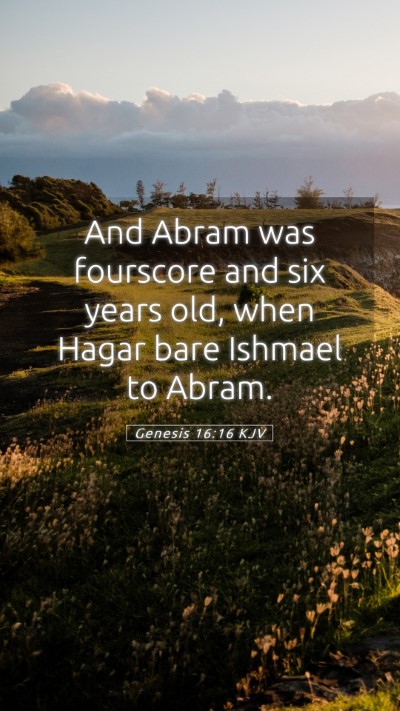Understanding Genesis 16:16
Key Verse: Genesis 16:16
"Abram was eighty-six years old when Hagar bore Ishmael to Abram."
Overview
Genesis 16:16 marks a significant moment in the narrative surrounding Abram (later known as Abraham) and his family dynamics, particularly concerning Hagar, the maidservant of Sarai (later Sarah). This scripture provides a chronological detail that highlights the age of Abram at the time of Ishmael's birth, deepening our Bible verse understanding of the context surrounding God's promise and the unfolding plans in Abram's life.
Commentary Insights
-
Matthew Henry's Commentary:
Matthew Henry emphasizes the implications of Hagar's role in the family. Hagar's conception of Abram's son Ishmael was a result of Sarai's impatience with God's promise. Abram's age at this time highlights the waiting period and the pressures faced when actively seeking God’s plans through human means. This scripture reflects not only on the personal trials of Abram but also sets the stage for later events in the biblical narrative.
-
Albert Barnes' Notes:
Barnes emphasizes the importance of Ishmael's birth in relation to God's promises to Abram. His commentary notes that Ishmael became the father of a great nation, as promised by God, but through the act of impatience and self-reliance by Abram and Sarai. The verse invites Bible study insights into themes of faith, the consequences of taking matters into one’s own hands, and the divine sovereignty over human decisions.
-
Adam Clarke's Commentary:
Clarke provides a historical context that enriches our Bible verse interpretations. He explains that Íshmael’s birth was not merely a personal event but played a crucial role in the lineage that is significant throughout the scripture. This verse serves as a pivot point that leads to further divine interactions and foreshadows future conflicts between the descendants of Abram and Sarai versus those of Hagar.
Key Themes and Applications
The birth of Ishmael raises various themes pertinent to understanding Scripture:
- Patience in God's Timing: Abram's decision to take Hagar as a concubine signifies a lapse in faith and patience while waiting for God's promise. This teaches that applying Bible verses to daily life requires trust in God’s timing.
- Human Agency and Divine Plan: The actions of Abram and Sarai show that human actions, whether faithful or not, contribute to God’s overarching plan, providing a rich area for Bible study topics.
- Consequences of Decisions: Ishmael's existence is a direct result of the decisions made by his parents. This highlights the importance of understanding the implications of one’s choices in faith and everyday life.
Cross-References
This verse connects with other significant scriptures throughout the Bible:
- Genesis 12:2-3 - God's covenant with Abram promising to make him a great nation.
- Genesis 17:20 - God's promise about Ishmael becoming a great nation.
- Galatians 4:22-23 - Paul's reference to the two covenants represented by Hagar and Sarah.
Conclusion
Genesis 16:16 serves as a foundational verse that enlightens readers on the importance of faith, the human condition of seeking to fulfill God's promises through our methods, and the beginning of a lineage that would have lasting implications in the biblical narrative. Whether through Bible verse commentary, Biblical exegesis, or understanding difficult Bible passages, this verse reveals the complexities of human interactions with divine providence.


